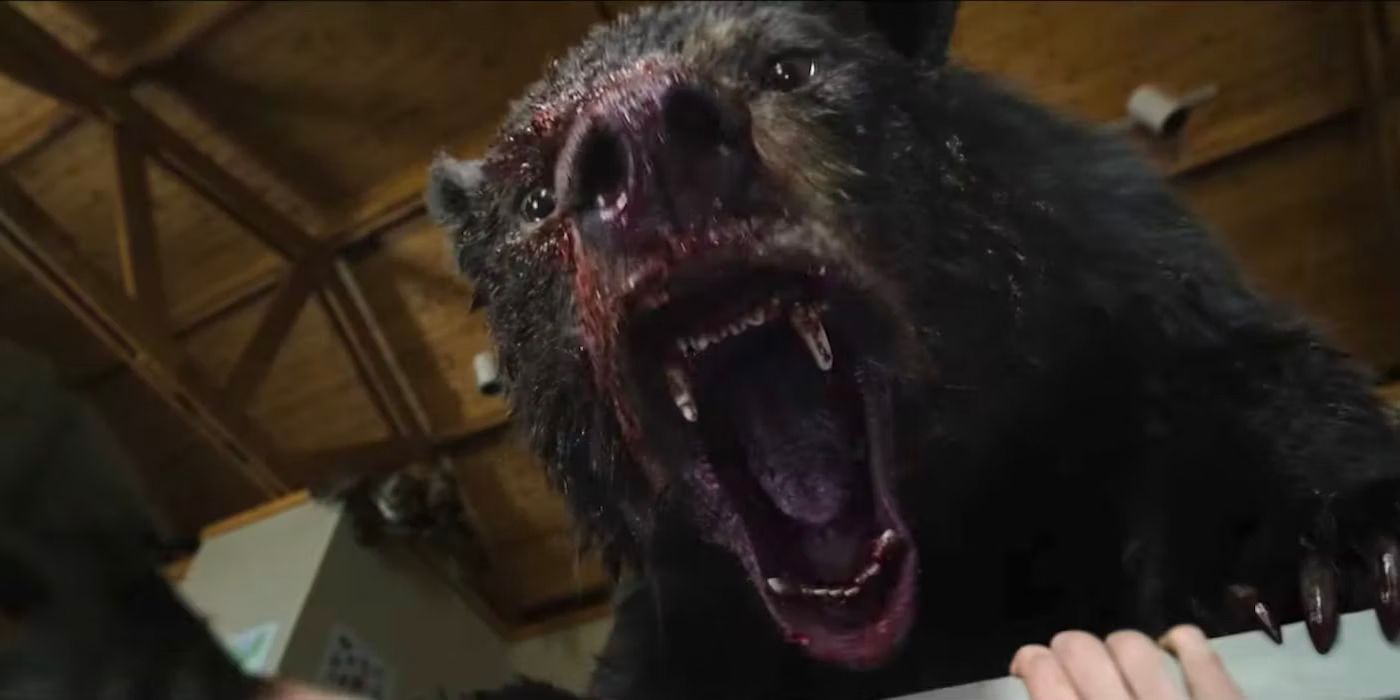Elizabeth Banks explains how her upcoming film, Cocaine Bear, pulled inspiration from Steven Spielberg, John Carpenter, and Sam Raimi. Cocaine Bear is set to premiere on February 24, 2023, and has been garnering quite a bit of attention for its bizarre story. The film follows a bear who unleashes horror on a small town in Georgia after accidentally ingesting cocaine and falling into a drug-fueled murderous rage. What makes the premise even more interesting is that it is actually loosely based on a true story. In 1985 a bear died in Georgia after ingesting a large amount of cocaine. The bear is now displayed in a museum in Kentucky and was dubbed “Cocaine Bear” in 2015.
In an interview with CinemaBlend, Banks revealed that Cocaine Bear was inspired by the works of Spielberg, Carpenter, and Raimi. Banks made the revelation to confirm that Cocaine Bear is far from just a typical horror/thriller film. There are deeper themes embedded in the film, and it pays homage to other filmmakers by adding heart, comedy, and a sense of wonder. Check out Banks’ statement below:
The movie, despite what you just saw, really has a lot of humor and heart in it as well. And, there’s some hugging, there’s some tears. It really is a story about fathers and sons and parenting and taking care of each other in crazy times, right? That’s one of the sort of thematics of this too, is just when things are going totally sideways, who can you count on? That’s a big part of the movie as well. That to me, the heart of the movie, the reason I made it was not necessarily because of the crazy bear. I do love these movies. I love horror and I love gore, and I love comedy and I love Sam Raimi and I love John Carpenter, and I felt like this was an opportunity to, this takes place in 1985. So this is a real opportunity to create a homage to some of those kinds of films, but also to do something really unique too, because it is also a character piece. For me, two Steven Spielberg movies that I really looked at when we talked about making this movie with the studio early on were Jaws of course and Jurassic Park because that’s the other thing about bears, it’s different from sharks. When you see a bear in the wild, sort of across the field or whatever, you don’t immediately want to run away. You think of a little cuddly or cute [bear]. And I thought Jurassic Park did such an amazing job taking that sense of wonder and awe that you haven’t seen something and then turning it into order when you realize it could be you. And that was the feeling that I wanted to get out of the audience. It would be cool to see a bear in nature. That would be fun. And, then also it could turn terrifying. Like if you weren’t paying attention or if the bear did cocaine.
Banks’ Cocaine Bear Inspirations Are A Great Sign
The inspiration that Banks pulled from is a good sign for her film, Cocaine Bear. Given the premise of her film, it would be easy to fall into a typical horror/survival plot. For example, it could’ve taken after something like this year’s Beast, which was considered by many to be entertaining, but ultimately failed to add something of substance. However, Banks seemed to understand that there is a bigger story to be told in Cocaine Bear than just a raging bear, and as much as she loves horror and gore, she wanted to add comedic and emotional elements to the film.
It is especially heartening that she drew inspiration from Spielberg’s Jaws and Jurassic Park. Both film franchises are based on a similar underlying premise as Cocaine Bear in that they feature raging animals and human interference. However, Spielberg masterfully invoked many elements into his films that made them visual spectacles, created a sense of awe and wonder, and fostered a discussion on the condition of humanity, rather than just being about rampaging sharks or dinosaurs. Banks drawing inspiration from Spielberg suggests that Cocaine Bear could run deeper than a basic survival thriller film.
Meanwhile, Raimi and Carpenter are also two strong sources of inspiration. Both create horror, but both also approach it uniquely. For Carpenter, he invokes tension, wit, and cinematography genius in his films to create a sense of terror without going over the top with gore and violence. Meanwhile, Raimi has made some very strong debuts in the horror/comedy genre, proving that humor and horror can mesh well when done right. Cocaine Bear‘s premise has it poised to benefit from all these influences, at the heart of the original true story isn’t a tale of horror, but one of absurdity, humor, and a touch of sadness at the animals who suffer because of human actions. If Banks truly does effectively draw inspiration from Raimi, Carpenter, and Spielberg, Cocaine Bear could turn out to be a fairly sophisticated film that does justice to the oddity of the true story.
Source: CinemaBlend

